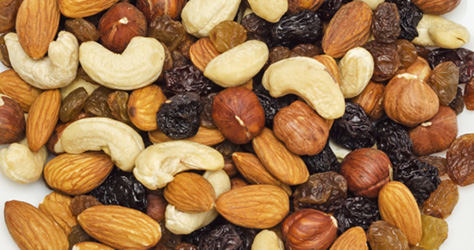Are you weaning your baby but baffled by different advice and confusing food labels?
Then check out our quick guide to foods to avoid when weaning.
At a glance
- At around the six month mark, your baby is ready for the extra nutrients they will get from solid food
- You’ll find natural sugars in fruit, vegetables and milk already, so it’s best not to add additional sugar
- Adult foods like gravy and sauces are often high in salt and additives which aren't good for babies

You say...
"I’m trying really hard to wean my baby with the right foods, but I keep hearing different advice, and food labels are confusing. So what foods should I avoid?"
We say...
It’s great you want to wean your baby on the right foods. And you’re completely right – some foods are more likely to cause problems than others. So here’s a quick guide to foods you want to limit and watch out for altogether.
Although very few babies have an allergic reaction to a food, you'll want to introduce the foods that could trigger an allergic reaction one at a time so that you can spot any reaction.
Foods most likely to cause an allergic reaction are:
- Cows milk
- Eggs (eggs without a Red Lion stamp should not be eaten raw or undercooked)
- Wheat based foods (eg. cereals/rusks)
- Nuts and peanuts (serve them crushed or ground)
- Seeds (serve them crushed or ground)
- Soya (including soya beans or foods containing soy)
- Shellfish (don't serve raw or lightly cooked)
- Fish
- Celery
- Sesame
- Mustard
Allergic reactions
An allergic reaction can include one or more of the following symptoms:
- Vomitting
- Diarrhoea
- A cough, wheezing, and shortness of breath
- Runny or blocked nose
- Itchy skin or rash
- Sore, red, itchy eyes
- Itchy throat or tongue
It's very rare for babies' lips, mouth or throat to swell up but if this happens then you need to call an ambulance or take your baby to A&E immediately.
Foods to avoid:
Do not give your baby any foods with any of these:
- Added salt
- Added sugar - babies already like sweet tastes and weaning is the best time for them to learn to like savoury tastes
- Honey - if your baby is under one year
- Mould ripened cheese eg. brie, camembert or ripened goats' milk cheese and soft blue-veined cheese due to the risk of listeria
Foods to limit:
It’s possible these foods could cause problems, so it’s best to keep them to a minimum till weaning is well established and your baby is used to other solid foods:
- Wheat-based foods - which may contain gluten (eg. barley and rye - including cereals and rusks)
- Citrus fruits - oranges, lemons and limes
- Fish and shellfish
- Eggs
- Foods that are high in salt - like cheese, bacon, deli meats, sausages, chips with added salt, crackers, crisps, ready meals and takeaways.
Dodge extra sugar
You’ll find natural sugars in fruit, vegetables and milk already, so it’s best not to add sugar to your baby’s food. You also want to avoid pre-packaged foods that sugar has been added to. And it’s not only the word ‘sugar’ you need to look out for - all the words below mean the food contains sugars:
- Fructose
- Glucose
- Fruit juice concentrate
- Syrup
- Molasses
Breastfeeding
The Department of Health recommends exclusive breastfeeding for the first six months. So unless your health professional says otherwise, it’s best to avoid all solid food - baby jars, cereals or rusks – till the six-month mark , when your baby needs the extra nutrients and their body is ready to process those all-exciting solids.